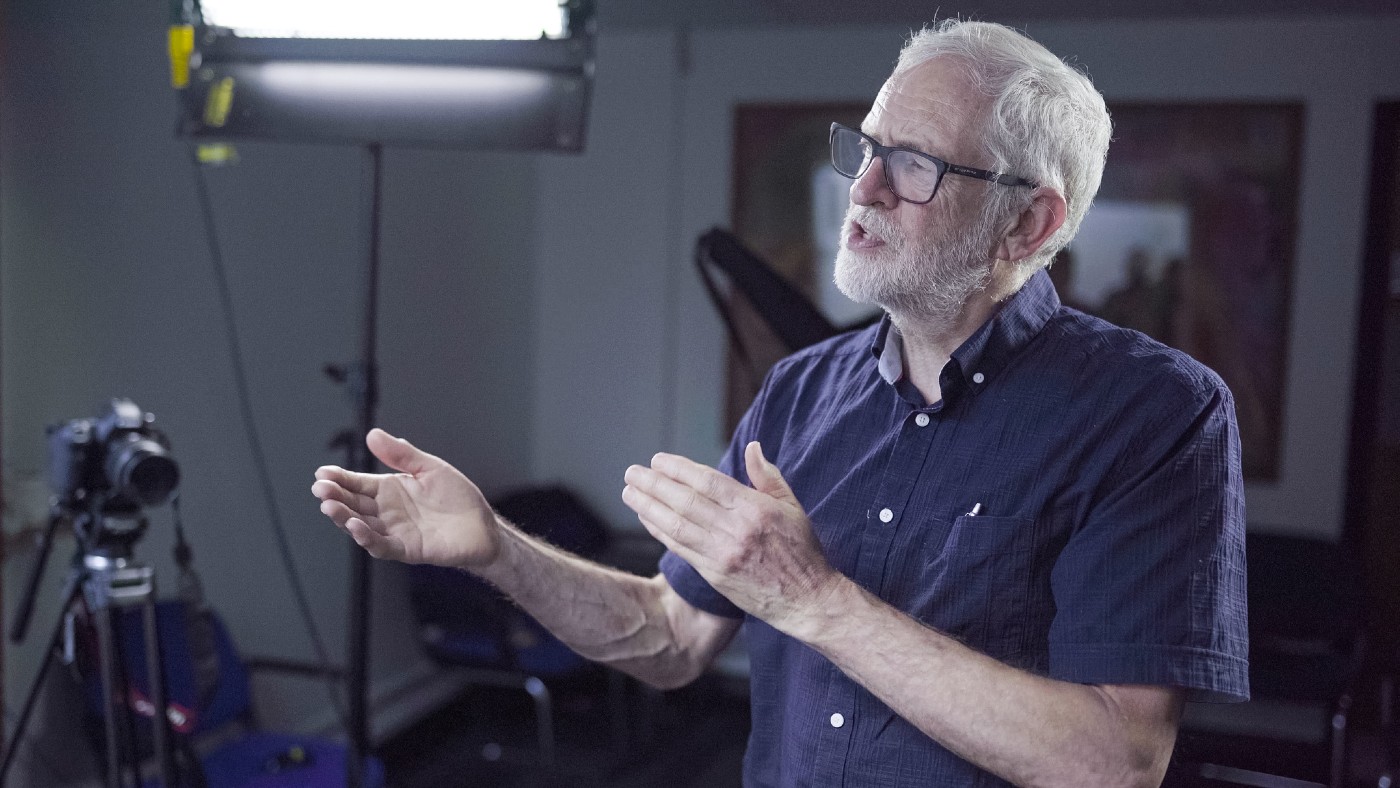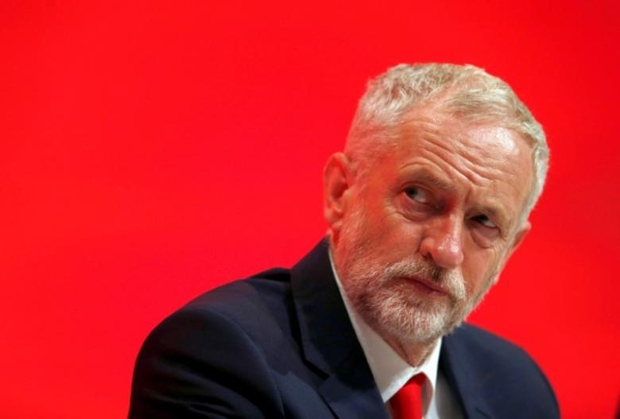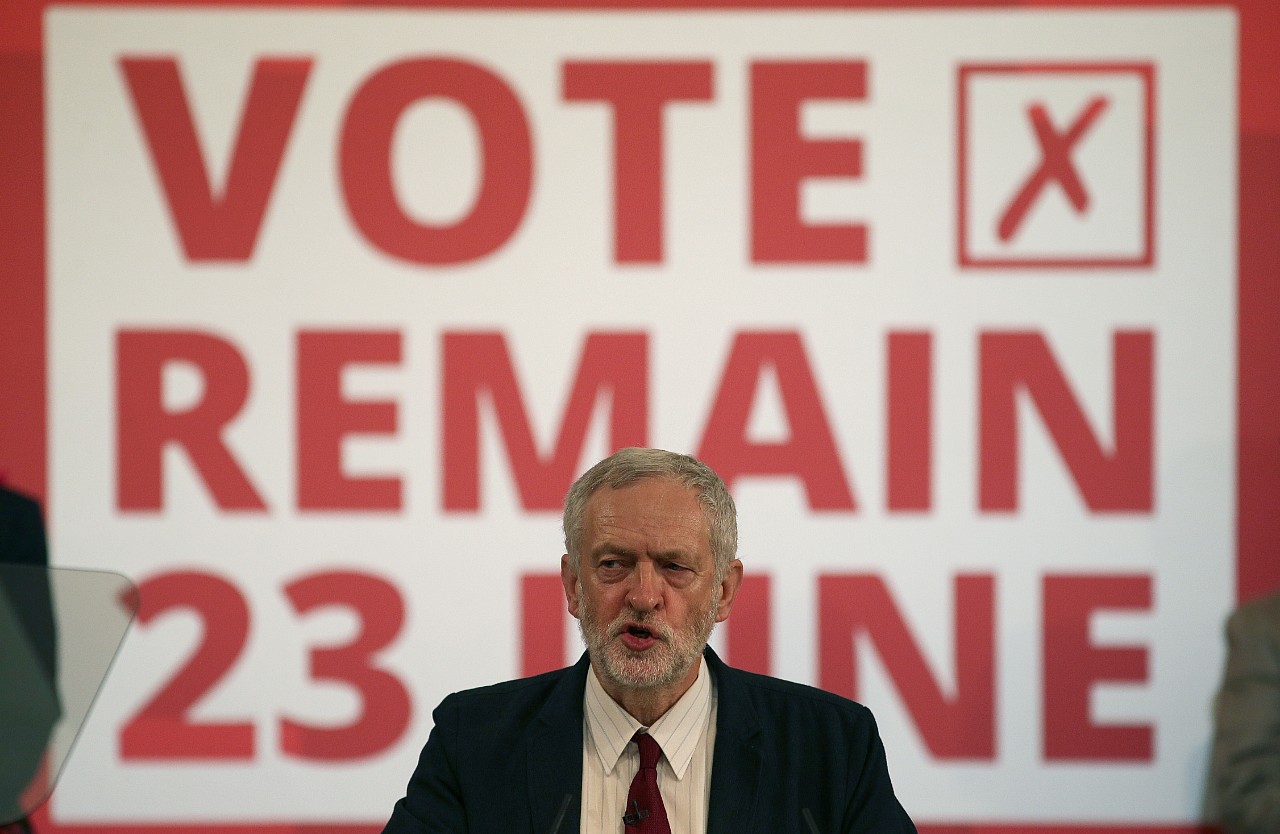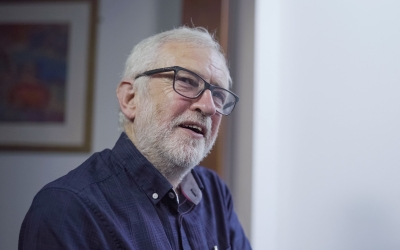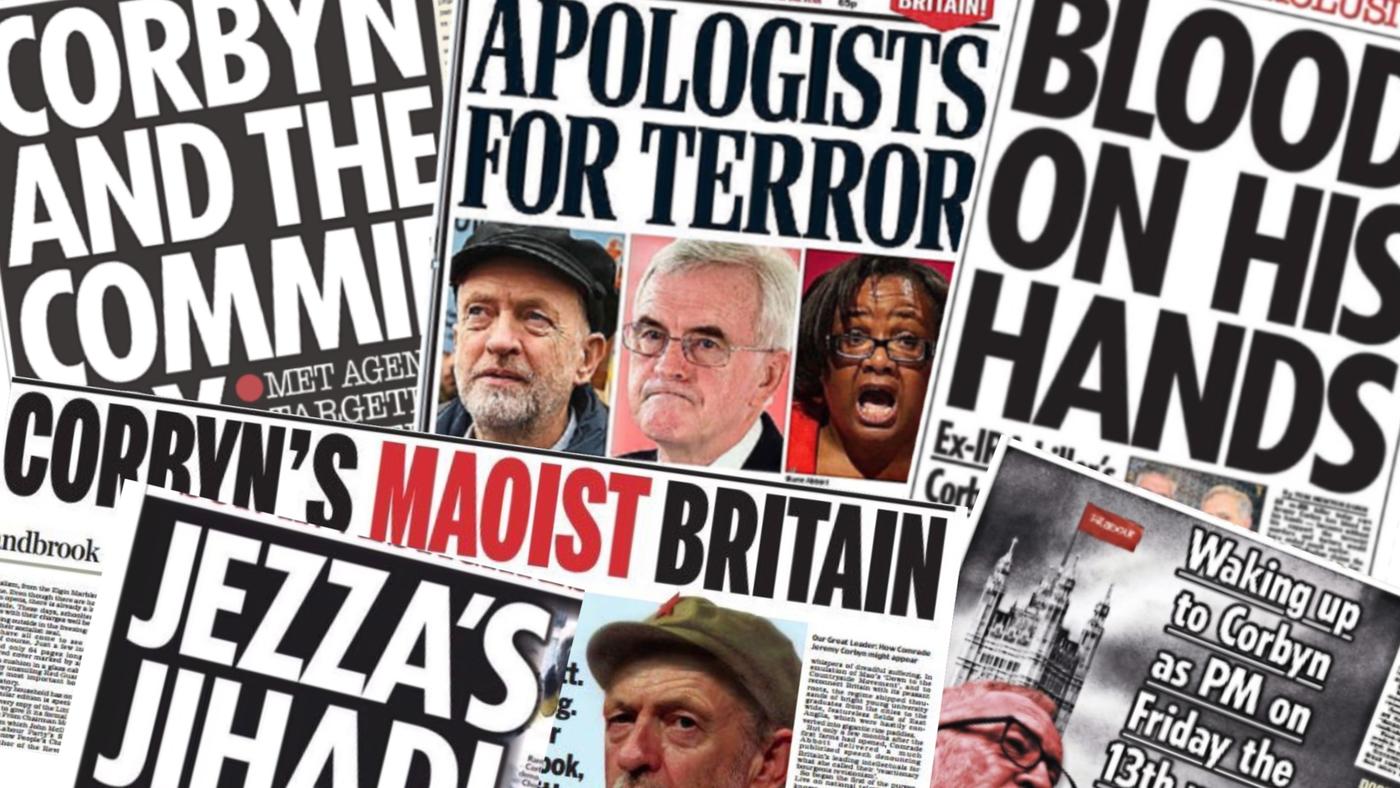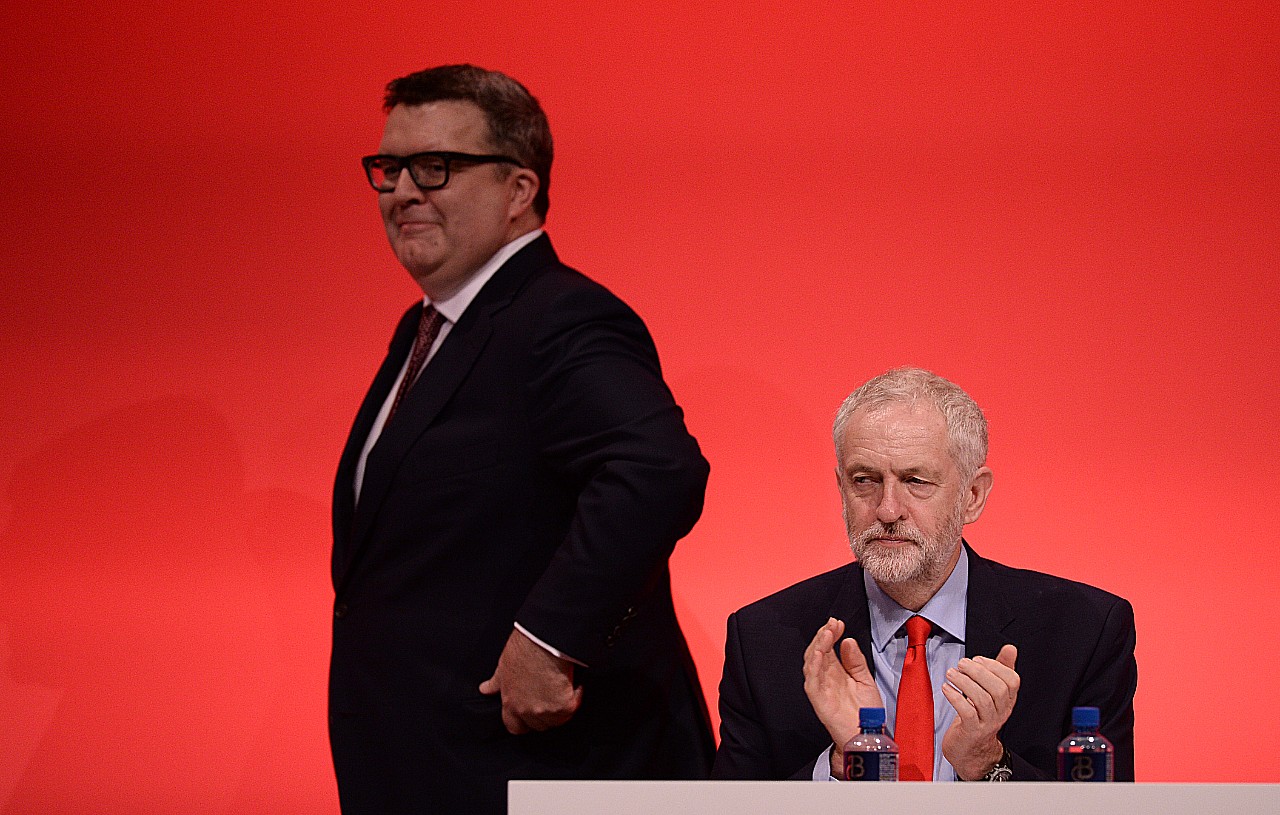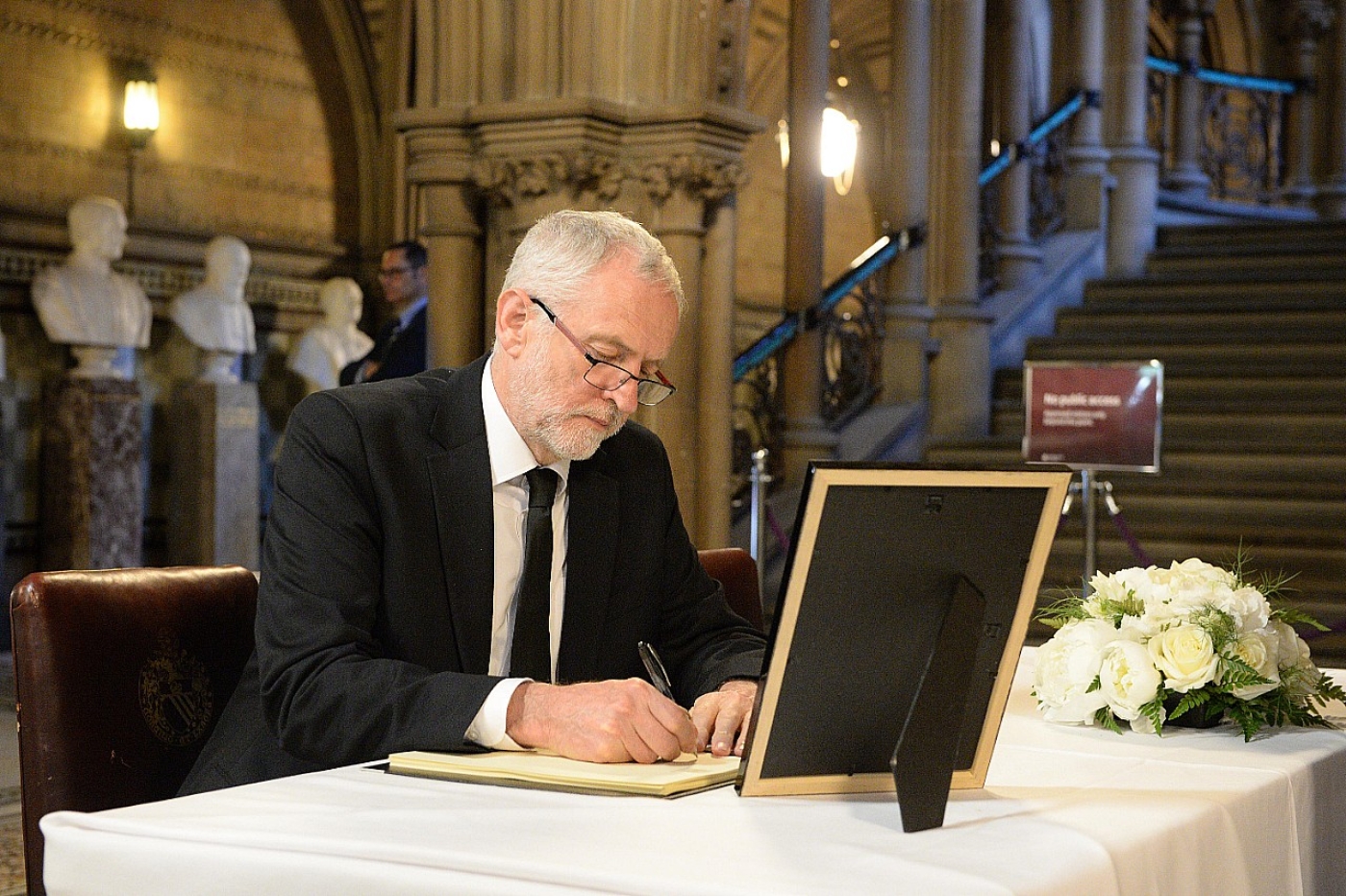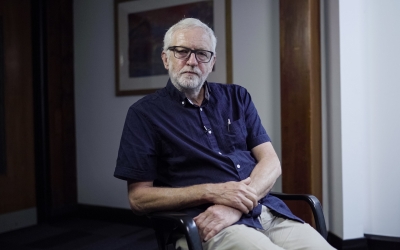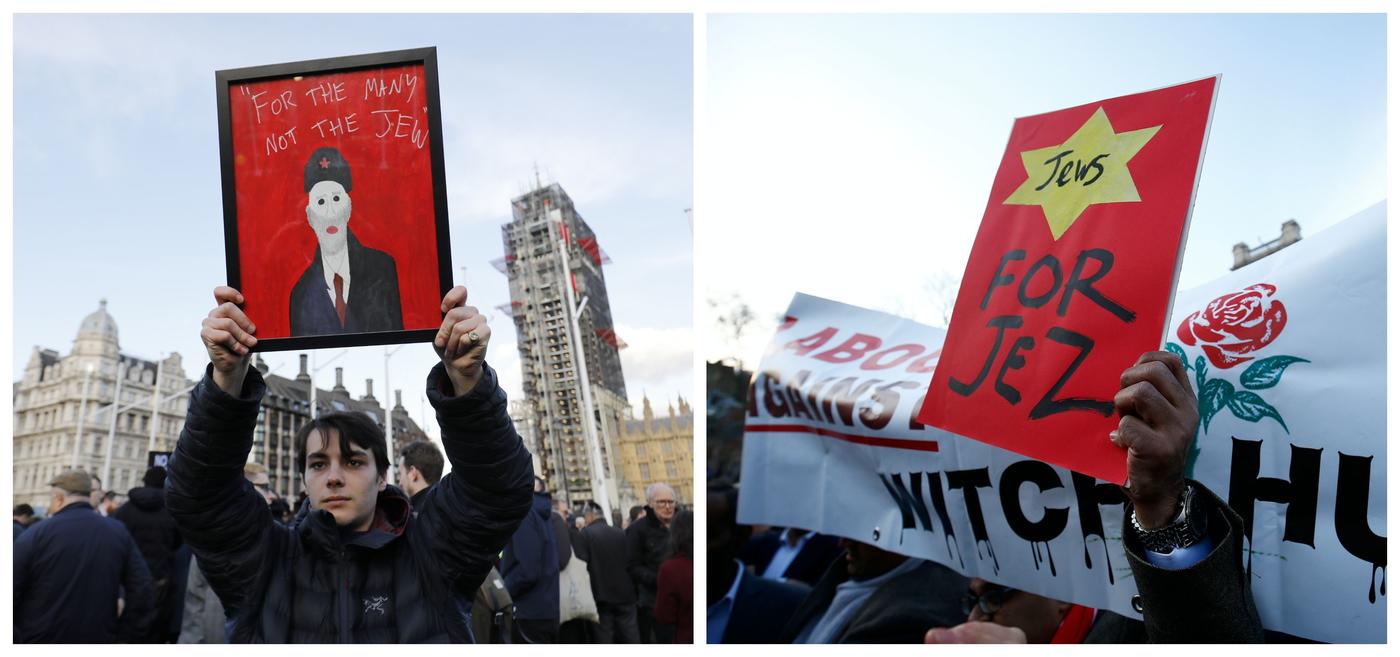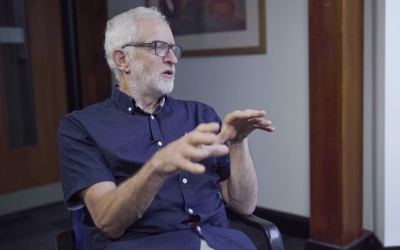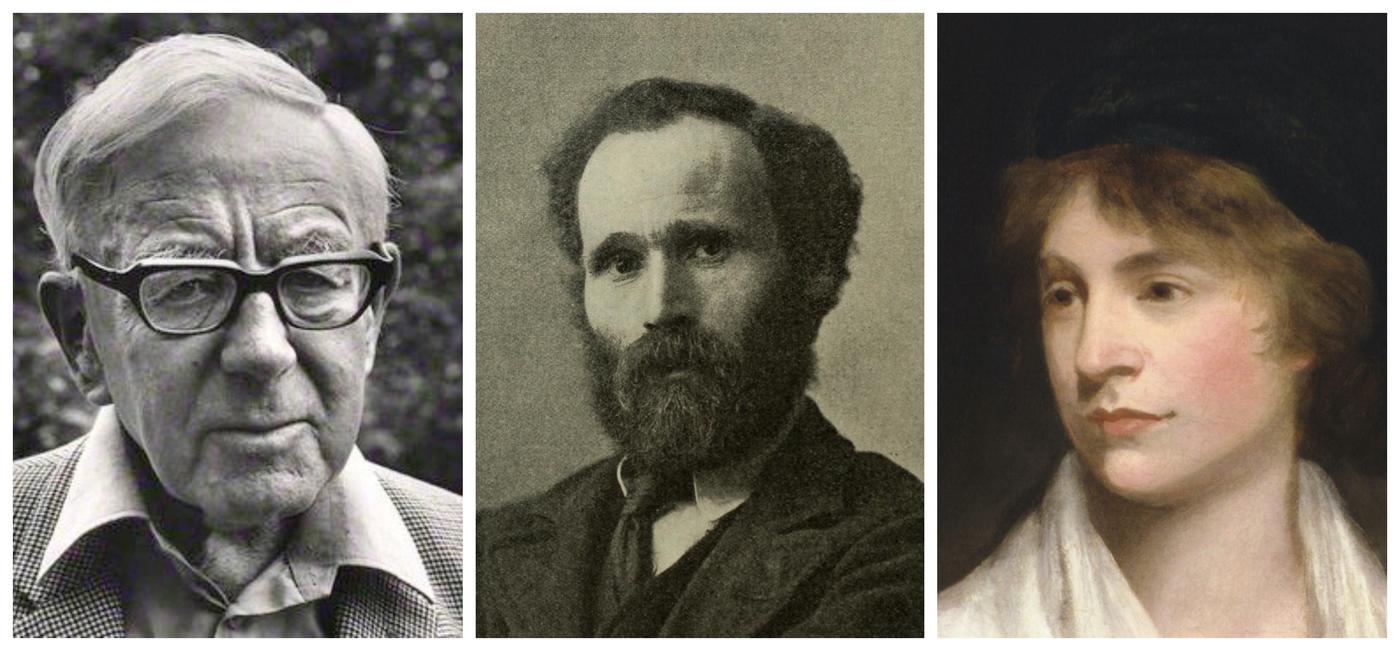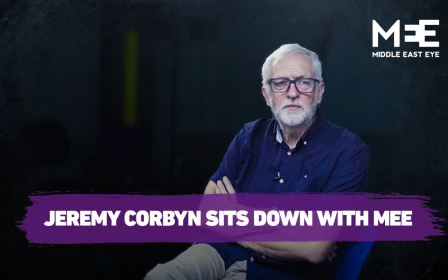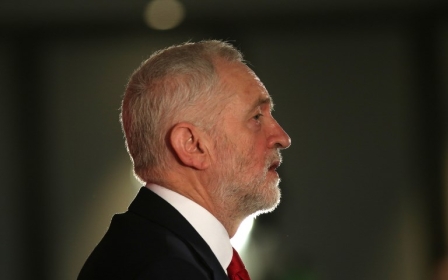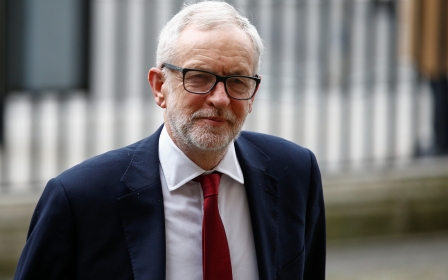Jeremy Corbyn interview: Full transcript
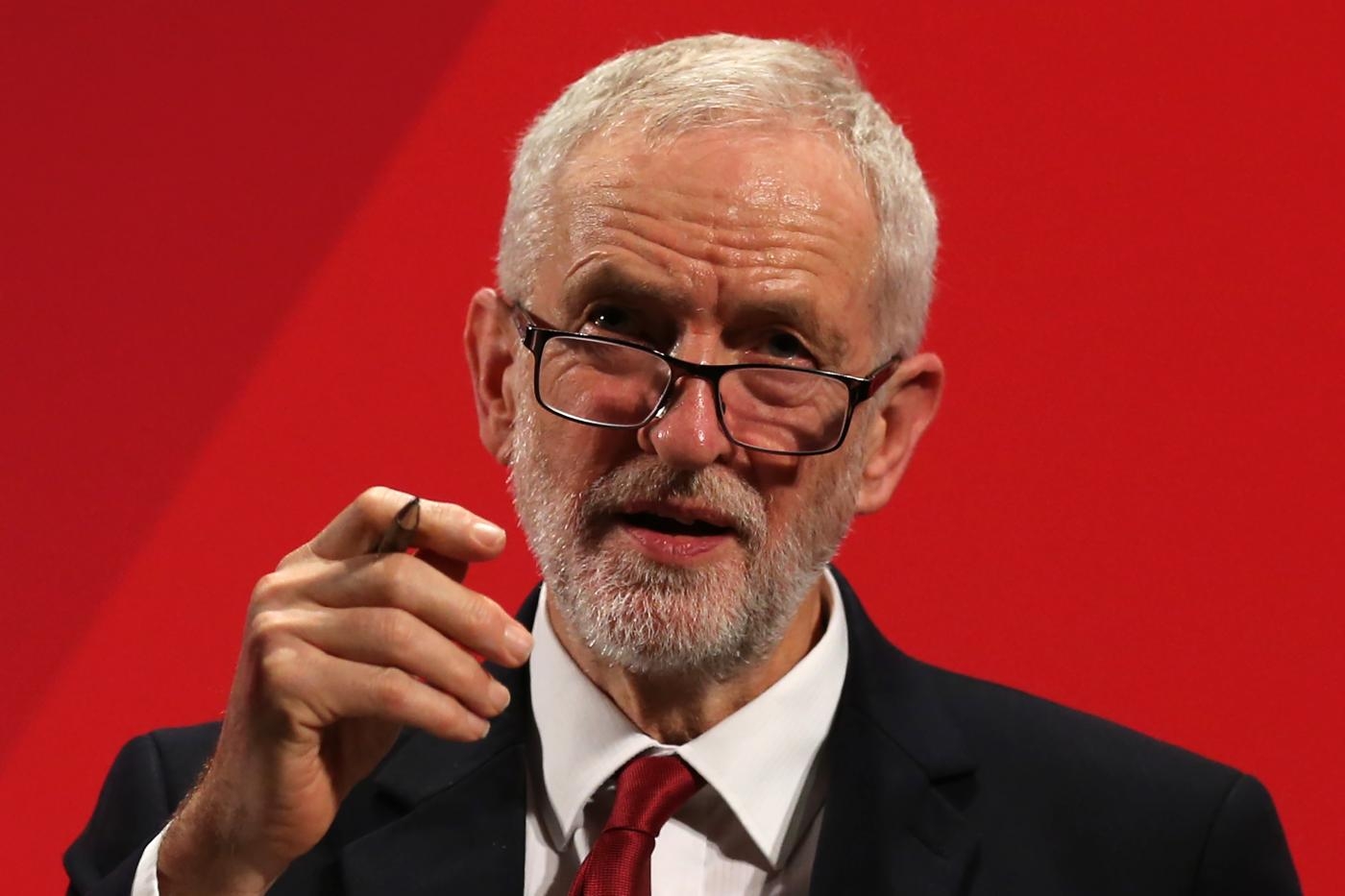
Editor's note: David Hearst, editor-in-chief of Middle East Eye, and contributor Peter Oborne sat down with Labour Party leader Jeremy Corbyn in late May 2020. The transcript below has been edited for clarity.
David Hearst: Hello, my name is David Hearst, I'm editor of Middle East Eye, with me is Peter Oborne. We are here to interview the Right Honourable Jeremy Corbyn, the former leader of the Labour Party, about what was a tumultuous, but important, leadership of his party.
Mr Corbyn, you have now had time to reflect on what happened during your period as leader. What would you say are the achievements of your time in office?
Jeremy Corbyn: More than trebling Labour Party membership. Changing the political debate on austerity into one of an investment-led economy and changing the political debate on the treatment of the poorest and most vulnerable people within our society. The way in which the government eventually responded to the corona crisis indicates that everything I was saying in the general election in November and December about investment in housing, health, education and support for manufacturing industry jobs has now come full circle.
New MEE newsletter: Jerusalem Dispatch
Sign up to get the latest insights and analysis on Israel-Palestine, alongside Turkey Unpacked and other MEE newsletters
And it's a Tory government that has, in many ways - not perhaps in the way I would have totally wanted - but in many ways, the principle of public spending in order to protect people in a crisis is now accepted as a political norm, it hasn't been, ever since the austerity budget of 2010 that [then-Chancellor of the Exchequer George] Osborne brought in. So, I'm proud of that.
I'm also proud of the way in which we developed the idea of a national education service, developed the idea of a green industrial revolution, and perhaps not as developed as I would have wanted, but we did go in the direction of a human rights-, peace- and democracy-based foreign policy, including the proposal of a war powers act and a re-examination of our role in the world. And so, I'm proud of a lot of what we achieved and in those areas, obviously very, very sad at the election result. In a sense, Brexit was a bridge that was too big for the Labour Party to traverse between strongly Remain areas, that were very strong for Labour, such as in London and my own constituency, for example; and equally strong for Labour areas in the north-east, south Yorkshire and the north-west that were strongly for Leave. I tried to bridge that gap with the proposal that we should do a trade deal with the European Union and put that alongside Remain as a choice for the people. And that was a decision taken at last year's Labour Party conference, and so it turned out not to be possible.
'Brexit was a bridge that was too big for the Labour Party to traverse'
So obviously, I'm very, very sad at that, but I remain determined that, personally, I will spend the rest of my life as I spent my life up to now: campaigning on the issues that I strongly believe in and representing people who are going through such terrible times in Covid. I'll just say this about Covid - because it does dominate everything - it's exposed the health inequalities around the world. It's exposed the interdependence of countries around the world and it's exposed the risk to even healthy people in healthy countries of a pandemic like this. It's also exposed the inequalities in our own society.
Where we're sitting now, it's in my office, in my constituency. Three minutes’ walk from here, there are several large housing estates. Those people going through lockdown, small flat, three or four children, no balcony, no play space, very hard for them to stay in lockdown. A more affluent middle-class family in a nice house in the suburbs, garden, work at home, it's not that difficult. And these are the people that are suffering through this, and it's the black and minority ethnic communities and the oldest, poorest and most vulnerable people that are dying because of Covid. It's exposed the fissures in our society. We've got to heal them.
DH: Do you think that shift you’re describing leftwards, ie you claim to have shifted the agenda leftwards, is a permanent shift or a temporary one under Boris Johnson?
JC: I think it's a permanent shift because when people go out every Thursday night to applaud the NHS, it's very interesting. The whole country does it, everybody, and they recognise we need our National Health Service. Now, there might be arguments about how it's run and so on, and so on. Fine. But the principle of healthcare free at the point of need is one that is now universally accepted in the whole of society. And those people are going out applauding the NHS are now demanding PPE, are now demanding decent pay. And they're no longer tolerating horrible language like "unskilled migrant workers", who are care workers and cleaners. They suddenly realise if you didn't have a good cleaner in a hospital, you're going to get disease. They are skilled workers as well.
Peter Oborne: I think I could add more to your list of achievements, for instance you were ridiculed about universal broadband, that was your call and now the government's going to do that. You can argue, very convincingly, that you won the argument in the election and it wasn't just before coronavirus. Already, that first Rishi Sunak budget [on 11 March ] incorporated an awful lot of your fiscal arguments and indeed, you know the Johnson government now is absurdly reckless compared to what you were proposing. But, there is this but... you know, the election result and those red wall seats, you know, the former mining communities...
JC: Obviously, devastated by the result. In fact, the number of people [who] actually switched from Labour to Conservative was quite small, about 300,000 I believe. You can argue about the figures, but it wasn't huge. The election resulted, as we all know, in a relatively close result, and it was a two-party race almost back to the 1950s map of Britain when, well, 89, 90 percent –
PO: - 95 percent –
JC: - 95 percent of the population voted either Labour or Conservative, it was back to that. This time, there was some growth in the Liberal Democrat [vote], but also the Brexit Party and its shenanigans of dropping candidates, putting candidates up in various place and so on obviously had a... was... it was a factor in all of this. The Brexit Party was always really a tool of the Tories anyway, in some form or another, in my view.
PO: But you didn't answer the question. Sorry [phone ringing interruption]. I mean, but you didn't answer the question. How do you explain the fact that these absolute core Labour seats, ex-mining seats in many cases, switch from your Labour Party to the Johnson Tory Party?
JC: The results we got there were bad in 2019, but in some of the constituencies, they were not great in 2017. We did very well in big, urban areas in 2017, but we didn't do so well in some of those older industrial, white, working-class areas except where there had been a complete change in the structure of the local community.
The sense of disillusionment in those areas with [the] modern economy is huge, and they've also had a steady diet for five years of unbelievable attacks on the Labour Party, on me personally and it had an effect. There's no question about that, it has an effect, if you're told, day after day in your daily newspaper, that the leader of the Labour Party is an evil person. Something gets through.
PO: It’s more than just the press, isn’t it? I mean in those areas, they were Leave areas, they obviously felt that your message was not really –
JC: Yeah. They were not in favour of the offer we'd put forward of a referendum between an agreement with the EU and Remain. I was faced with a problem after 2016 from the referendum then, that the vast majority of Labour members, Labour Party members, were for Remain. The majority supported a concept of a second referendum, which was a huge issue, as you know, up until... well, for a long way through all this it's been a huge issue. And a majority of Labour voters were in favour of Remain, but a substantial minority, probably 40 percent, 35, 40 percent, something like that, were... were for Leave. And the Labour Party Conference of last year had this very difficult chasm it had to cross. And they came to a compromise that was agreed by, put forward by all of the unions, both those very strongly Remain unions like TSSA Unison and those very strongly Leave unions like ASLEF and Bakers [Food and Allied Workers'] Union. And the bigger unions were reflective of their membership on this. And so, it was a compromise that, clearly didn't find favour with Labour voters in those areas. But had we gone in any other direction, I'm quite clear we would have lost support in London and the south-east. And there are, what, nearly 57... I think it is... Labour MPs in London, for example.
DH: So you’re damned if you do and damned if you don’t -
JC: Whatever we'd done was going to be difficult, and in the election campaign I was trying to point out that if we reached an agreement with the EU on trade, it would be about protection of workers’ rights, environmental standards, consumer rights, and it would not be a bargain basement economy to please Donald Trump, which I suspect is what Boris Johnson was then trying to do. What he’ll try and do now? I'm not entirely sure.
Fundamentally, whether we're in or out of the European Union, a Labour government led by us would be one that would want high-quality jobs and an investment-led economy, hence the National Investment Bank, hence the infrastructure investment, hence the green industrial evolution, hence the broadband offer that we made during the election campaign. And I tried to get that message across.
DH: Did you personally get Brexit wrong, in the sense that there’s this persistent claim that you didn't campaign hard enough? That yes, in the referendum, it was a bit wishy-washy, that you pleased virtually no one? Looking back on your time, are there honestly points at which you would say: "Actually, I should have done something else?"
JC: Well, in the referendum in 2016, the Labour policy was for Remain and reform of the EU because the EU, yes, it has quite good basic environmental standards, it has quite good intentions on workers’ rights, they're not as strong as they ought to be, but it also has a bit of a penchant for neoliberal economics. Look at the way it treated Greece, look at the lectures that they're given to southern European countries during the financial crisis. And my view was that if we remained in the European Union, ours would be a voice for interventionist economics, would be for full employment, would be for minimum welfare standards and a European-wide minimum employment standards, because at the moment there are very low wages paid in eastern Europe and that means that people leave eastern Europe to work somewhere else and send the money home. And the issues of inequality and the treatment of those migrant workers when they come to western Europe is disgraceful. So mine would have been a voice that would have been very, very different.
So, in the referendum campaign I was trying to articulate why I thought we should remain and reform the European Union, I was not going to go down the road of the Better Together campaign, which was so disastrous for Labour during the [2014] Scottish referendum. But the media during the referendum campaign were quite interesting, because from their point of view, the only show in town was the blue-on-blue war. So, the stories, day in, day out, were between [then-prime minister David] Cameron and Boris Johnson, basically, who were obviously on opposite sides on the EU referendum issue.
Did I campaign hard enough? I did more visits, more, more miles, more meetings, more rallies than the rest of the shadow cabinet put together. I spoke at rallies on Perranporth beach in Cornwall, and I spoke to fishermen in Aberdeen. I travelled the length and breadth of the country on it. And so, did I not do enough? I think that is, frankly, a bit unfair. Nobody said that during the campaign. They only sort of concocted the story afterwards.
PO: George Osborne I think was the first to blame –
JC: And how much did he do during the campaign? [Laughs] He was probably busy applying for his seven jobs then.
PO: Following up, I mean, given what you're saying about a more human, more worker-friendly Europe, do you now feel that you should have backed Mrs May's deal? Because it was open to you at any moment, to throw the weight of the Labour Party behind Mrs May's deal, which would have been a much softer Brexit, potentially even continued membership of the single market, conceivably the customs union. Did you ever feel that in retrospect, that was a mistake?
JC: We did go into negotiations with her. We were serious about it and we went on for six, seven, weeks and, we had teams of people involved dealing with the environmental aspects, dealing with the workers’ rights aspects and dealing with future trade arrangements. We made quite a lot of progress on the workers’ rights side of things. Becky led on that part, [shadow secretary of state for business] Becky Long-Bailey. We didn't make as much progress as I wanted on environmental standards and protection of those, and it seemed to me that that was the area that we could not reach agreement on. And so, there were, obviously, a lot of discussions and I deliberately made sure the teams doing the negotiating were balanced between the individual views of people that were known to be Remain and known to be Leave in the talks that went on. Eventually, the shadow cabinet concluded the talks had reached their natural conclusion. So, we then left them at that point.
Could we have done a deal? I'm not sure that deal would have stuck within the parliamentary Labour Party anyway if we had done a deal. The parliamentary Labour Party, as you know, was divided on the subject and indeed, the deal that finally went through - the Johnson proposal, the one bill that Johnson put up - went through with Labour support, not mine, but with a minority of Labour MPs, voted for it from strongly Leave areas, thinking it would save their seats.
PO: But the thing is, now we've got what looks like the ultimate hard Brexit, no deal Brexit, from [the] Johnson government. A year ago, just over a year ago, there was a real, there was on the table a soft Brexit from Mrs May's government, which you could have led Labour towards.
JC: Well, Labour as a whole were not going to buy into that and one of the litmus tests of this was the referendum issue. There was never a parliamentary majority for a second referendum. The closest it came was a minority of 30 I think, or some, something around there, and there was never a parliamentary majority for that.
And, looking back on it, could things have been done differently? Well, obviously, things can always be done differently. Would the result have been any different? I'm not really sure. I think the problem was that many parts of this country have seen no investment for a very long time. They've seen deindustrialisation that started in the 1980s, have never seen the replacement of cherished and now lost industries with good quality jobs. And you have communities where there's very low levels of union membership, there's very high levels of insecure work and very high levels of institutional poverty within those areas. And our economic success in the past has actually been predicated on cheap Chinese imports as much as anything else. And so, the economic system that developed in this country during the 90s and early 2000s was actually [based on the] ever-reducing price of Chinese imports, a deindustrialisation at the same time, the replacement of manufacturing jobs by service industry jobs.
And we therefore have a fundamental economic weakness in Britain, which is not the same particularly in Germany, because you have essentially a kind of agreement across the political spectrum in Germany that it is the job and duty of government to be involved in industry and major investment decisions. [Also] to a slightly lesser extent in France. And so, we have a structural problem which has to be addressed, which is why [then shadow chancellor] John McDonnell, Becky and myself made a great deal about investment in a green industrial future for this country, were very serious about that.
DH: You were savagely attacked as leader... a lot of the attacks were against you personally. You were called a racist, you were called someone who tolerated antisemitism, you were attacked by the former generals for being a danger to the security of the state. Were you prepared for that? You were also undermined by your own party, not least [by] your deputy leader.
Were you prepared when you entered this job for that level of personal hostility, aimed at you? It's an irony that, in fact, a lot of the attacks were personal, and they weren't policy based, in fact what you were saying received actually a good press, and what John McDonnell said received a good press. It was you personally that they were going for. Were you prepared for that?
JC: No, you know, you can't be prepared for it. I mean, obviously, in a whole lifetime of political activity, I've had lots of issues where, I think, the media have been very unfair to me. And there was a process of personal abuse against me, against my wife, against my sons, family and so on. And the obsessive nature of the British media, it was quite extraordinary. But also, the way in which stories would suddenly take hold.
There was a time last year when apparently a group of civil servants said that I was unfit, that I was not capable of concentrating on anything, and that I wasn't medically or physically capable of doing the job. So, I asked for a Cabinet Office inquiry into which civil servants had said this. And I was told in terms that "no stone would be left unturned" in sorting out who had actually made these foul allegations against me. Apparently, there are still a lot of stones that need to be turned: nobody has been identified as making these remarks.
DH: How did you react to this between the four walls of your family? Were you tearing your hair out? Were you calm?
JC: No, you know, I'm very calm. I'm a very calm person, which actually makes my family very annoyed. Sometimes –
PO: Let me read out –
JC: Sometimes they wish I was a bit more like... one other point just to make about media is, at some level, it's kind of laughable, that the various papers, Mail, Express, Telegraph particularly, were kind of obsessed with me and my family. The Express dug up somebody who was apparently a great, great, great, great uncle removed, who I'd never heard of, who apparently ran a workhouse in 1830. Oh, I’d never heard of this guy, nobody in my family ever heard of this guy, where did that come from?
And then, another paper sent a whole team of people tramping all over Mexico looking for Laura's family [Laura Alvarez, Corbyn's wife], people she used to work with and so on and so on, to ask what they thought of me. I mean, some of these people had never heard of me. I mean: "Huh? Huh? What are you on about?" And it was this sort of obsessive stuff, which was kind of at one level laughable, but all designed to be undermining. So, it meant every day, when I would want us to be pursuing a political agenda on homelessness, on poverty in Britain, on housing, on international issues, what was our media team doing? Rebutting these crazy stories, abusive stories, about me the whole time.
And it was... um... is it unpleasant? Yes, it is unpleasant, yes. Do you feel that you're under a constant microscope? Yes, you do. I mean, when you've got photographers that hide behind trees in a park while I'm using an open-air gym. I was in Finsbury Park one day at the open-air gym and there was apparently a photographer, I suspect from the Daily Mail, hiding behind a tree. And these young men going by said: "Oh yeah Jezza, there’s some guy over there I think he's really dangerous. Do you want us to sort him out?" So, I said: "No, no. Leave him alone. Just tell him to go away." Well, this is bad. This isn't politics. This is an obsession with destroying an individual. Well, you know what? It didn't work.
PO: I had a look at some of your newspaper headlines before coming here –
JC: God, you must have got up early -
PO: "Jezza’s Jihadi Comrades." "Blood on his hands." "Corbyn and the Commie Spy." "Corbyn's ISIS Past Revealed." "Corbyn Not Upset Enough Over Paris Terror Attacks." "Jezza’s Jihadi Comrades, Apologists for Terror." And, I think, when you finally came to election day, "Waking Up to Corbyn as PM on Friday 13th Will Be The Start of a Nightmare." When you get those day after day, how do you deal with it?
JC: Well I read The Daily Mail for election day after the election, because I got a copy that day and I read it a week later. I read it from cover to cover on a Sunday afternoon, a wet Sunday afternoon, when I was tidying up my study and at the end of it I put the paper down. "Wow. This Corbyn guy, God he’s evil. I wouldn't want to live in the same street as him." And it was just crazy.
PO: I’ve got the Daily Mail. [holding up newspaper]
JC: Oh, you've got it there. Is that the election day one? Or is it a Brexit one? Oh, yeah. But the Czech spy stuff was extraordinary. That this claim, somehow or other I was involved with Czech spies and was spying for the Czech Republic, and indeed somebody libelled me on this and it cost him a lot of money, which was all given to an appropriate charity. And I remember meeting this guy from the Czech embassy in the Pugin Room, which is the very nice tea room between the Lords and the Commons. And we had tea, which I paid for, lemon tea, and I believe there was a cake involved, or a biscuit, it was very excessive - two biscuits, possibly. And this guy is [a] completely inconsequential conversation. I was utterly bored by it. I saw another Labour MP wandering down the corridor who didn't seem terribly busy, so I shamelessly went up to him and asked him if he'd like to meet some interesting people from the Czech Republic. And he came and joined us and then I disappeared. And I put in my diary that night: “I met two people from the Czech embassy. God, they were boring. I have no idea why they came.”
PO: Do you have a, do you keep a diary?
JC: No, not always. I did at that time.
PO: You do have one?
JC: No, no, no, not all the time. I do write notes from time to time, and I've also got probably three or four hundred notebooks. I kept notebooks all my life when I was a union organiser, and before that when I was travelling around Latin America, when I worked in various jobs. And they've become an almost, a social history. So, I've got notebooks of my work as a union organiser, which have things like the issue of the safety in a particular school kitchen, because I used to represent some school meals workers in schools around here, alongside a meeting I would have spoken at that night as a councillor in Haringey.
So, you've got these sorts of notes of all aspects of my life, which are almost like a diary. And I've got hundreds of these notebooks that take up a great deal of space. They should be scanned, I'm sure.
PO: Perhaps you will one day.
JC: There’s always one day for that. Yes.
PO: But what David Hearst was referring to earlier... you have, on the one hand, a very, very concentrated, calculated press campaign, day after day. The same point, which is more concerning in many ways, were these briefings from inside the military, that you are a "danger to security". And as somebody brought up with the idea of the British system being that anybody can govern so long as they're elected, and it's the job of the military, the civil service, to work with them, to get briefings from inside the armed security services and the armed forces were appearing, I think, mainly in The Daily Telegraph and elsewhere. What is your view of that?
JC: Well, the briefings were designed to undermine, and designed to disagree with my world view. My world view is of the fundamental problems facing this planet are the environmental crisis, are the levels of inequality across the planet. And that... the way in which Britain went into wars in Afghanistan, and particularly Iraq, have very serious long-term consequences, and at the risk of quoting myself, if you forgive me, when I spoke at the huge rally in Hyde Park on February 15th 2003, I said: ‘This war, if it goes ahead in Iraq, will lead to the refugee flows of tomorrow, the terrorism of tomorrow, and the wars of tomorrow, and the misery of tomorrow all across the region." You look at the refugee camps in Jordan, in Lebanon, in Libya, in Turkey, in Greece. All of those are a consequence of both the Afghan War and of the Iraq War. And so, I don't want to—
PO: You haven’t mentioned the Libyan intervention where you were one of 12 MPs in the House of Commons who voted against. And that, of course, has led to the catastrophic refugee flows, return of slavery. I mean it’s been -
JC: And we were accused of being stooges of Colonel Gaddafi. I never met Colonel Gaddafi. I'd never been to Libya, despite invitations from his government to go. But I said I was not prepared to visit Libya as a guest of the government, I would visit Libya independently if I could have independent access to any group I wanted to, that's my basis of when I go anywhere. And so, I never went there. But so far as I was concerned, there could and should have been agreements reached with Gaddafi - and indeed, [former prime minister Tony] Blair reached some levels of agreement with Gaddafi.
We then got into the idea that, somehow or other, [that] bombing Libya would bring about a peace and security. What it's done is unleash proxy wars in Libya now, with Turkey supporting the recognised government or recognised by some people, other Middle Eastern states supporting those that are opposed to that particular government. We've got a ghastly civil war going on in there, compounded by the numbers of very desperate people that have ended up in Libya, who've come from Senegal, who've come from other parts of west Africa, where they're living in terrible poverty, Burkina Faso and so on. And you've got really there a microcosm of all of the world's problems and the deaths of thousands over the past decade, trying to cross the Mediterranean to get to a relative place of safety at Lampedusa or somewhere else in Europe. And so, my view was the bombing of Libya would actually make the situation worse. Where was I wrong? I was pilloried at the time.
DH: Were you a tough enough leader –
JC: [clearing throat] Sorry.
DH: Were you a tough enough leader? Did you have enough teeth as a leader? Did you tolerate attacks? For instance, [Labour politician] Margaret Hodge called you a racist to your face inside the House of Commons, she repeated that in the Guardian the next day. Shouldn't you have sued? Shouldn't you have defended yourself and said: "No, I'm not a racist, prove it"?
JC: Well, I do defend myself by pointing out my record on opposing racism in any form whatsoever in society, and I have done all of my life. Was I too tolerant of people? Well that’s an interesting question. My style of leadership is very different to others. I didn't want to be a dictator, I wanted to be a leader that built by consensus. And-
DH: But there was no consensus in the Labour Party. Half of them were desperately trying to get you out.
JC: Well, the coup that took place in 2016 was a dramatic time. The referendum result was what we all know. And a few days later, I dismissed Hilary Benn as shadow foreign secretary because he had written an article in the Observer attacking me, which was published, of course, and others then resigned. And there was then a meeting of the parliamentary Labour Party, which passed a motion of no confidence in me. I pointed out that I'd been elected by the party membership, not by the parliamentary Labour Party, and that as leader, I would seek support from the party members. A challenge was mounted, as you know, and I was re-elected with a larger majority in 2016. Three hundred thousand people voted for me to remain as party leader, despite all the attacks of that year - well it was less than a year since I’d been first elected.
The problem is the parliamentary Labour Party is obviously of finite size, you can only be a member if you’ve been elected to parliament, and I had to work with the parliamentary Labour Party that was there in order to fulfil the various appointments and positions. And I did appoint a balanced shadow cabinet and then, after the 2017 election, I changed the shadow cabinet quite a lot and brought in a lot of new people, new faces and it worked together actually quite well, despite all the endless debate we had over Brexit, we probably had [as] many debates over Brexit as the cabinet itself had.
It's a style of leadership issue. I think leaders who dictate tend to isolate themselves and therefore everything falls upon them and it doesn't motivate others to be involved. And so, what I wanted to do was create a more democratic atmosphere within the Labour Party and the Labour movement as a whole.
Could things have been done differently? Obviously, you can do things differently. That was my way of doing things. That was my whole lifestyle of doing things. But, do I have strong principles that I won't deviate from? Yeah, I do. Of course, I do. I believe in social justice. I believe in environmental sustainability. I believe in trying to bring about a world of peace. I do believe that the poverty and insecurity in this country and across the world is actually a danger to everybody. Corona crisis has proved that to be the case.
PO: Do you feel though, that you, again in retrospect, [when] these very serious and strongly put allegations were made against you, that if you’d sued and taken them on, dealt, confronted them at that point, it might have been more cathartic in the end? You might have dealt with the allegations?
JC: There's always a temptation to go to court on cases when nasty things are said about you. And it is very tempting. You think, wow, that is just so wrong, so nasty, so dishonest. I'll sue them for libel. Tony Benn once said to me, he said: "Jeremy, libel is a rich man's game, and you're not a rich man." He said: "You can't afford it. Go to, go to a libel case - even if you win the case, you'll be destroyed financially in doing so." And we do have an issue surrounding media and media balance in this country. And I was trying to bring forward proposals on media ownership, on access to media and I gave a MacTaggart lecture on this in Edinburgh during the Edinburgh Festival in 2018, which was about proposals for future media ownership, which I think are important. And I do think we have to look at this whole question, media control. Obviously, things could have been done differently. There could have been a different style and way of doing things, but that was my way and that was my style.
DH: The internal Labour Party report, which has been leaked, contains a great deal of evidence that there were elements inside the machinery of the party that were actively working against you, particularly before the very good result you had in 2017. Do you have anything to say about that?
JC: I won't comment on the leaked report itself because that will be subject to inquiry and so on, but what I would say is that when I was nominated to be leader of the party in 2015, it was a very difficult process to get on the ballot paper. But I made it easily, with 90 seconds to spare when the last nomination was made. And so, I was a candidate and at that point the bookmakers gave me a 200-1 chance of winning. I wished I put money on it. I'm not, I'm not a betting man, but y'know, anyway.
I always knew that there was a culture in the Labour Party that was not a healthy one, of an almost self-perpetuating bureaucracy. All organisations have a degree of self-perpetuating bureaucracy about them. And I wanted to change the way in which the party operated by changing from being a solely bureaucratic machine that administered the party, disciplined members and observed the rules and so on, into a community-organising base of the party. And when I was first elected, I met the executive board of the party and the General Secretary at the time, Iain McNicol, and so on. And I said: "I'm not here to start a war with you, I'm not here to get rid of you all, what I want to do is develop the party in this kind of direction". And we had the utmost resistance to bring in community organising, which is where Iain McNicol and I finally parted company. And in the 2017 campaign, there were people saying this has got to be a defensive campaign, there's no way we can win it, there's no way, we're too far behind and so on. And I said: "Look, it's a long campaign. We can go out there. We can mobilise a bigger electorate. We can mobilise people who will see hope in what we're doing." And then Andrew Fisher was the main author of For the Many, Not the Few and that was an absolute gamechanger.
I realised when we launched that manifesto, we had a real chance of winning. We did it at Bradford University. I was standing there in the atrium of the university where we launched it and all above there were various galleries in the building, all of which had glass screens in front of them. And it was like that last scene out of The Graduate when Dustin Hoffman is waving through the glass in the church. And I looked up there and every single gallery had students listening to what we were saying, listening to what we were saying. Listening to what we were saying. And it was clear to me that the leaked manifesto - I was really angry about it being leaked, it was absolutely not me that leaked it - had actually a much better reaction than we expected and the support for that manifesto was huge. The party bureaucracy was so leaden-footed it couldn't appreciate what was actually happening on the ground. That's why every time I got back to London –
DH: Was it leaden-footed or was it hostile?
JC: Well, interesting question. I took it. [This refers back to] your earlier question about my innate generosity. I said: "Look, think of what's going on out there. There are a lot of people getting involved in politics for the first time. There's more people involved in our campaign than ever been involved before. There are people just forming their own campaigns to support Labour candidates. Think about it. This is the great moment." And when Theresa May said something like Corbyn's afraid to go to the north-east as she addressed a rally of 20 people at a golf club, we then organised a rally, which we were going to do anyway, outside The Sage in Gateshead. We had 10,000 people there at two days’ notice. That was a sign of what was happening.
And I obviously deeply regret the result of 2017 because we came so, so close. Maybe we weren’t going to get an overall majority - that, that would have been a huge, a huge jump - but I thought we were in a position where we would have formed a minority government. And I made the point all along, we would not form a coalition with the SNP or with anybody else. We would form a minority government and take our chance.
PO: I must say, I mean, the internal Labour report - this is one official quoted in it: "As the exit polls predicted a hung parliament, we are silent and grave faced opposite to what I have been working towards for the last couple of years." It must be pretty gut-wrenching for you to read stuff like that.
JC: Yeah, of course. Because I didn't spend much time in the party head office in 2017. It's not my job to be there all the time. I was out on the road. And indeed, the manifesto was signed off by a combination of emails and text messages on trains, with me around the country during the whole campaign and my job was to be out and about. And I did 100 events all over the country during that period. There were others on my behalf, having these arguments about what were the priorities and there was still this argument, "we've got to be defensive" and I said, no, go out there, go to all the constituencies where we've got the outside chance of winning and go for it, and look at look at the places we gained.
PO: A few years ago now, I had a conversation with somebody who'd been inside Conservative Central Office. He said something really interesting, which was when they saw you go out after the terrible tragedy of the Manchester bombing [in May 2017] and you went and said something along the lines of "British foreign policy carries its share of responsibility for this", he said in Central Office, they watched this, and they said: "We’ve won the election." And they realised two days later from the polls that no, what you'd said had really resonated. Is that the sense you saw?
JC: That was the toughest decision we had to take during that campaign. The Manchester bomb was appalling and abominable in every way, obviously, and I remember I was in Doncaster when it happened, we were on our way from Hull to Doncaster and we then stayed overnight there. And the prime minister called me at about one o'clock in the morning and we discussed what had happened. Then I went to Manchester the next day to join in the silence and commemoration outside the town hall. And then the campaigning was suspended for a few days and we then discussed it all. And I was of the view that we had to have a considered response to this which said, there is an element, an element, of British foreign policy that is causing this in Britain.
I decided I would make this speech and we made it on the following Friday morning, I think it was at the Mechanics Institute in London, and I was very strongly advised by a lot of people, don’t do it, don't do it, no, this is wrong. This will actually play against us. And I said: "No, it's the honest response to give. It’s a serious response. It's not condoning in any way whatsoever, what happened was abominable and appalling."
And so, I made the speech in the morning and waited for the reaction. And a few hours later, I didn't know they were doing it, YouGov did a telephone poll, which came out with 60 percent saying Corbyn's on the right lines here. I stand by every word I made in that speech and... I think it was the right thing to do because it also helped to frame a debate about the kind of foreign policy we had. And I did then - I'm not sure the sequence of events - but I also did during that campaign a quite long event at Chatham House in which we had a discussion about world affairs, about refugees, inequality, and poverty and so on, and the need to have the basis of our foreign policy being respect for human rights in every country in the world.
I've always sought in all my meetings with any leaders, to raise issues of human rights. So, when I met President Xi, I raised issues of human rights in China. We got into a very long discussion about collective versus individual human rights because the Universal Declaration in 1948 actually recognises both. As far as he was concerned, it was all about collective rights and housing, and education and health and so on, and not about individual rights. I had a meeting with Prime Minister Modi and raised a number of issues about human rights in India, in which I can't pretend we reached agreement, but it was an interesting discussion.
I also met President Obama for a quite long meeting, I had an hour with President Obama. And while he was still president at the time, he was on a state visit to Britain, and it was a very interesting discussion and, about what his view was and his concerns about the powers of global corporations over national government. And I sort of complimented him on Obamacare and he looked at me and he said: "That's very generous and very kind of you, but I think it's my greatest failure because I wanted a real health service, - like you've got." So, whoever I meet, whoever they are, I raise these issues, however uncomfortable it is, because if you don't raise it when you've got the chance, what's the point?
DH: You're a lifelong anti-racist campaigner. And yet you never shrug off the repeated claims that you tolerated antisemitism in the Labour Party, that antisemitism was a problem in the Labour Party and, you apologised. Did you, do you regret not fighting that smear more stringently? And do you accept that you were targeted, principally, not because of an inherent problem in the Labour Party or that you consorted in any way with antisemites, but because you were a lifelong supporter of the Palestinian cause?
JC: Look, let’s unpick that. Antisemitism is an evil and is wrong. Jewish people have suffered antisemitism from the 13th century or before. You look at the books, the legend of the Wandering Jew, the way in which Jewish people were expelled from Britain in the 13th century and came back under [Oliver] Cromwell, but nevertheless were still discriminated against. Antisemitism is rife and has been historically in Europe and indeed around the world.
It is evil. It is wrong. The Nazis exploited antisemitism for their advantage, decided that all the problems of the Weimar Republic were nothing to do with the chaos of the Weimar Republic, or the results of the conference at the end of the First World War, the Versailles Conference, but instead, all the problems, all the fault of the Jews. They started by opposing Jewish people, they then moved on to beating up Jewish businesses, they moved on to killing people, and that ended up with the extermination camps at Dachau and Bergen-Belsen and all the others. It is an absolutely appalling history of where racism and antisemitism lead to. I grew up in a family that were obviously opposed to racism in any form. My mum was there at Cable Street in 1936. That's the sort of background I come from.
When I became leader of the Labour Party, I discovered that there were a small number of cases where people had been accused of antisemitic work, remarks within the party and there should be a process for dealing with them. I asked for what the process was, and I was not very satisfied. I didn't feel we had a very strong or robust process for dealing with this, and then allegations were made about people making antisemitic remarks at meetings and trolling people and being abusive to Jewish Labour MPs. Absolutely, totally unacceptable in any form. The numbers involved were actually very small.
So, I asked Shami Chakrabarti to do an investigation into this and produce a proposal, which she did, which was to have a stronger governance unit, have it independent of the party leadership, and that cases should be referred to them for process. I had a very strong view in my office that I was not to be the judge, jury and decision-maker on each case. Any case that was brought to my attention - and some were, people wrote in and things like that - I didn't deal with it, I passed it straight on to the governance and legal unit. That process needs to be examined very closely, how efficiently they dealt with those or didn't deal with those, and the party policy has to be one that we don’t tolerate antisemitism in any form.
It also has to be clear that we do not tolerate any form of racism within our party, any more than any other party should. So, the allegations of Islamophobia in the Conservative Party also deserve to be investigated. And unless we, as a society, recognise the cancer that racism in any form is, then we're weakened as a society because that leads to wasted opportunities, it leads to damaged lives, it leads to violence against individuals on our street.
DH: But why did this happen under your leadership as opposed to [predecessor] Ed Miliband's? Objective evidence says there were actually more incidents of antisemitism under a Jewish leader than it was under you, before all this started.
JC: Well, it came up very heavily against me and I believed –
DH: Why you?
JC: They attacked me all the time on this. I think it is wrong, because I think I'm the one that actually introduced a process for dealing with it. There has to be an examination of the way in which that process operated. I then realised there was a logjam building up in the party on individual cases. And so, I proposed the expansion of the National Constitutional Committee, which was duly done in order to deal with cases more quickly. I also introduced a system where egregious cases could be dealt with very quickly, but still within the ambit of rules of natural justice. And so, I feel that the attacks on me have been extremely unfair on this.
PO: [The BBC investigative programme] Panorama says, or contains, very serious claims that you actually impeded antisemitism investigations by the Labour Party.
JC: That is absolutely not the case, I was the one that introduced a system to ensure they were properly dealt with. What I inherited was a system that was not effective, that wasn't clear, that wasn't definitive. And that's why I asked Shami Chakrabarti to do her report and she also recommended in that there should be a process of education as well, as to what antisemitism is or what any form of racism is and the use of language and behaviour. And historically in Britain, the tolerance of antisemitism is huge. When you think of Churchill's antisemitic remarks all through his life... And the degrees of acceptance of antisemitism throughout our history is huge. And I think there has to be a challenge to that or any form of racism. And that is what I tried to do within the party as party leader and it's what I spend my life doing.
DH: But do you accept that as a result of this whole storm, that never really died away and is continuing as we speak, with the future publication of the report by the Equalities Commission -
JC: Remember the Equalities Commission is now an arm of government. Remember that. It's not a –
PO: Why do you say that?
JC: Because I think it's quite significant that the Conservative government has underfunded the Equalities and Human Rights Commission, indeed I went on demonstrations outside its office to demand better funding of it and took place. And for some reason, which I don't fully understand, they decided to take it away from its independent status and make it part of [the] government machine. And I think it's quite important, and had we won the election, I would have reinstated the principle of its complete independence, but also of a wider Equalities and Human Rights Commission, so it dealt with, maybe in separate arms of it, age discrimination, gender discrimination and so on, within our society. Because I do think, the Equalities Act of 2010 was an important step forward in the direction we should go as a society.
DH: Are you suggesting that that could colour their decision on the Labour Party?
JC: Let's see what happens.
DH: Do you accept that as a result of you having lost this battle to clean up the Labour Party, or the label that there is an antisemitism problem specifically in the Labour Party, stuck under your leadership, that it has now become much more difficult to campaign for the Palestinian cause? All sorts of people, including a very distinguished Middle East Eye columnist, are now being accused of antisemitism simply and solely because they're sticking up for the Palestinian cause.
JC: Shami made it very clear in her report that antisemitism was completely unacceptable and that in any discussion of the issues of Palestine, of Israel-Palestine relations, or of the future of Palestinian people, it is perfectly possible to have those discussions without indulging in any form of antisemitism. And it is. And I indeed have been, as you know, a member of Palestine Solidarity Campaign, and I've been at Palestine Solidarity Campaign meetings where somebody has made antisemitic remarks and they've been removed from the meeting as a result. PSC did that. They're very clear about that and they’re right to be, of course.
And so, I have always supported the need for recognition of the state of Palestine. And I propose that, and it was in both of our manifestos and I hope that will remain their full recognition. I've also made very clear my opposition to the Trump plan, because I think if the Trump plan goes ahead, then the chances of a two-state solution just disappear with it because, in fact, there would be no contiguous Palestinian area at all. It would be a series of islands of what would be called Palestine, which would be Ramallah and Jericho, and one or two other places. I mean, it is a proposal which essentially is [Israeli prime minister Benjamin] Netanyahu's dream of taking over virtually the whole of the West Bank.
PO: Can I ask you, do you think that the British government, the foreign secretary and the Middle East minister have protested enough about this plan?
JC: No, I don’t think they protested enough about this at all. And it's quite interesting that a cross-party group of MPs have written on this, and I support that letter, saying that there has to be the strongest possible protests.
My worry is that the Trump plan is so extreme that it will be rejected. But, and I say this sadly, in reality, the Trump plan is actually a continuation of the demands of the Right in Israel politics for a very long time. The danger is there would be some slightly less aversion of the Trump plan proposed where there's not quite as much expansion, not quite as many settlements, and this will be somehow seen as a victory. The whole process has been that Israel has continuously put in more and more settlements, denied Palestinian people access to land, built a wall through farms that have made it impossible to run a sustainable farm and put the people of Gaza under siege.
I've been in Gaza, I've been in the West Bank, I've been in Israel, I've spoken to people of all sorts of views there. And it's very hard to put yourself in the place of somebody else. But I remember the first time I went to Gaza, this was in the 90s, I met this lady who was, it turned out, exactly the same age as my late mother, exactly the same age within a month or so. I don't know how the conversation got onto that.
PO: We bring our mothers with us wherever we go.
JC: Indeed, we do. This is true. And so, I sort of reflected on the rich and varied life that my mother led. And then I said to this lady: "What's your life been like then?" And she described the village that she came from in 1948, which is now where Israel is. And she said since then she's been living in Gaza, and she's grateful to the UN Relief and Works Agency for educating her children, and providing food and water supplies, and so on. But she says: "We've been living under siege ever since." And I said: "What about your sons?" None of them lived with her. None of them lived nowhere near. They were away somewhere; one was in prison, one was abroad and so on, and so on. And you just reflect on her life and then look at the lives of, of young people in Gaza.
Gaza is the most educated place in the world. The highest level of a population with degrees is Gaza. The highest level of people with PhDs is Gaza. They can educate themselves, there’s great universities and colleges and so on, but they can't travel anywhere. And so that sense of isolation. I remember going to a primary school, the top end, the northern part of the Gaza Strip, you can go to the top floor of this primary school. You can look one way and you can see the fence with Israel beyond it. You can look the other way and you can see the sea. Out in the sea, you can see the Israeli boats that are preventing the Gaza fisher people going further out. On the other side of the fence, in Israel, you can see cars, you can see life, you can see irrigated land and so on. And these kids, being brought up in this school, with a very good school but underfunded and so on.
And last year, and the year before, I was in Jordan visiting a school in a refugee camp there, and I asked the head teacher: "How much money do you have to run the school?" And he gave me the figures and I sort of did a rapid calculation in my head. And it was quite a good secondary school, I met the school council, students, as impressive as in Jordan. And I worked out that his capitation funding was much less than half that would be available in a secondary school in Britain. And he said it's going to be halved again, straight away, and it’ll be cut more, and the school may have to close in two months’ time because the US, at that point, Trump had cut the funding for it, for UNRWA. And so, it's that sense of anger among Palestinian people that I'm not sure people outside fully understand.
But also, there's an underestimate of the feelings of people in Israel against it. Last week, I was on a conference call with people from both Palestine and Israel, people from Meretz Party, people from Gush Shalom, from B'Tselem, different peace groups within Israel who said there was a lot of anger and concern that the Trump plan will actually make their lives more dangerous, will make the situation for people in Israel more dangerous. So, the Trump plan is, I think, an absolute disaster waiting to happen.
DH: Do you think that the future will regard you more kindly than the present?
JC: Well, it depends who you mean regarding me more kindly.
DH: I mean that you would have been genuinely a radical prime minister.
PO: Can I put it in a different way? AJP Taylor gave his lectures in 1956 at the University of Oxford about the British radical tradition. It turned into a wonderful book, The Troublemakers. And he traces a tradition of Englishmen and Brits from Tom Paine to [William] Cobbett, Keir Hardie. And he says that these, and he goes through these characters, they're outside the governing tradition. They are troublemakers. They're radicals, he calls them. They never win power in their lifetimes, but they win the future. They become, whatever their views, their views, 20 years after that. And they're not always right. Taylor said they were against World War Two as a whole these radicals. They were against World War One, that was right. They were against it. But whatever their view is at any given time becomes the orthodoxy 25 years later. Do you buy into any of that?
JC: Yes, I do. The future is getting closer. Yeah. I mean, I, AJP Taylor wonderful guy. I loved the way he always brought in coincidences as well. The worst - if somebody had, if only they delayed a bit longer at the ticket office and not caught that train, they'd have survived, and so and so would have happened and the X, Y, Z would not have taken place in history. Wonderful. And his talks on television, I remember them as a child. They were absolutely brilliant, I was riveted by these things. The rest of the family: "Well, what you watching that for?" I said: "Oh shut up it’s really good." Yeah, you know what it's like with groups, I grew up with three brothers who...
Anyway, I do think that that great radical tradition is a very strong one. And we deny our understanding, our own history at our peril, because there is a very strong radical tradition throughout Britain, which is often denied by the teaching of normal history. My mum and dad wrote a history of the village they lived in before they died. And at one level, a history of a village is about the church, it's about the buildings, it's about the streets, it's about who owned the land and so on, and so on, and so forth. But they decided to write about the machine riots of the 19th century, about the way in which the agricultural workers tried to destroy the machines that were being brought in because they were able, these machines, [to] thrash corn very quickly, could plough fields very quickly and so on, and deny them work. And of course, there was a purpose behind that, to drive them into the cities to work in making those very same machines in the cities. And so, there's that radical history that runs all through our lives.
Now, the people you mentioned, Peter, such as Keir Hardie and Tom Paine and others, Tom Paine is a fascinating figure. And his writing of the Rights of Man was obviously enormous, and his role in the supporting the French Revolution, and then going to America, and so on, was absolutely critical. But the interesting one was Mary Wollstonecraft. She lived just down the road from him, just a 15-minute walk from here in Newington Green. And she was really naffed off by Tom Paine. "Hang on what’s all this? What about the rights of women?" So, she wrote the treatises on the Rights of Women and founded the girls’ school in Newington Green. And she is one of my great heroes because of the complicated life that she led, the tragedy of her death at the birth of her daughter Mary [Shelley] and, of William Godwin and all of those, that great radical tradition. And so, I think we have to remember all of them and the contribution they made.
Hardie is to me, an absolutely fascinating figure, a child labourer in the mines, quite religious and strong in the temperance movements, ended up working for the church and the temperance movement. Eventually becomes a miner's agent organiser and eventually becomes the first Labour MP. And he had this amazing internationalist view. Now, where did that come from? Because this is a man who had grown up with very limited education, taught through the church and, taught himself a great deal, became a member of parliament, and during the time as a member of parliament, he travelled to South Africa, he travelled to India, he travelled the United States. And it wasn't a question of hopping on a plane and getting to Mumbai six hours later. It was a question of two weeks on a ship. And the same for South Africa, same for the USA. And then he built this relationship with people and stood up against the indentured labour system in South Africa, against the caste system in India, and against the exploitation of migrant workers in the United States and brought all that back. He opposed the First World War because he felt, and he'd worked with Jean Juares and others in opposing the First World War and trying to build this workers unity across Europe. And Adam Hochschild's book about the opponents, the First World War, is a very instructive book. And in doing all of that, he eventually was defeated by the, I don’t know, the xenophobia of the time, the nationalism of the time, and he was unable to sustain that and eventually died from a heart attack.
I think it was brought about by his depression at the way in which the basic tenet of international solidarity of the working class in Germany as well as in Britain and France and so on, had been so defeated by the Kitchener campaign. And I think he's somebody that we should think about and remember quite a lot, of standing up against the tide.
PO: Yes, he lost his immediate political battles, but he won his long-term political battles.
JC: Well, he's the one who's remembered.
PO: Can I just ask Jeremy one final thing? Unless it’s too late?
DH: Go on. One more question.
PO: So, you’ve had a very bruising and must have been exhausting, morally challenging, four, five years. How do you plan to spend your future?
JC: Well, as busy as ever. I am the MP for Islington North and very proud to be so and I have never neglected my constituency, and never would, and didn't while I was leader of the party either. This is one of the big arguments in the office. I said: "Fridays is constituency day. I'll be there." They said: "Yeah, but we'd like you to –" I said: "No. I will be there." It may be I’ll travel somewhere in the evening or whatever, but I [will] always be there, and I think it's important for two reasons. One is because it's your duty, if you’re elected to represent an area, you have to represent an area and you can't, there's no substitute for actually being there and getting involved in the random conversations on the doorstep, on the street and so on, about people's lives. It keeps you grounded. It keeps you regular. And so, I've done that. So, I'm doing plenty of that. I've been volunteering at all the food banks in the constituency during the corona crisis, and I'm doing a lot of work on international issues, peace and justice and human rights, and working on environmental issues as well.
So, I'm extremely busy, as I've always been, and I have never given up my allotment either, and won't. And indeed, I'm about to plant out all the maize next weekend. It's growing nicely in the back garden and it will be taken up to the allotment, growing, we grow two varieties of maize. One is F1 hybrid maize, which is developed in Europe and grows very fast and looks very good and all the rest of it. But we have a far more interesting maize that's Mexican maize in honour of Laura. And it is multi-coloured and it's beautiful to eat. But it's slower growing in this country, but it grows very well in Mexico. We just need a bit more sun here.
PO: Well it looks like it will be a hot summer.
JC: One hopes.
DH: Thank you Mr Corbyn for a very full interview and good answers. You can watch this on www.middleeasteye.org and associated platforms. Thanks also to Peter for joining me.
JC: Thank you very much. Really enjoyed it.
Middle East Eye delivers independent and unrivalled coverage and analysis of the Middle East, North Africa and beyond. To learn more about republishing this content and the associated fees, please fill out this form. More about MEE can be found here.


